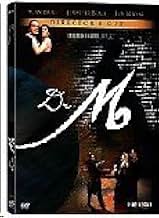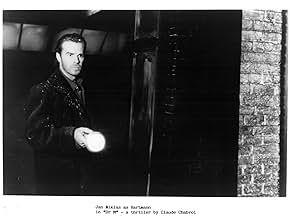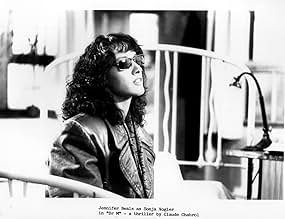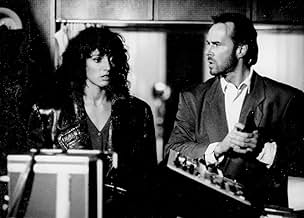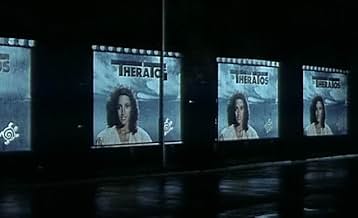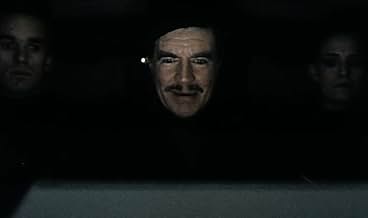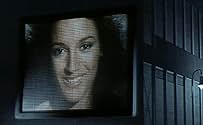AVALIAÇÃO DA IMDb
4,8/10
556
SUA AVALIAÇÃO
Adicionar um enredo no seu idiomaInvestigating a series of suicides, police detective reveals a sinister plot.Investigating a series of suicides, police detective reveals a sinister plot.Investigating a series of suicides, police detective reveals a sinister plot.
- Direção
- Roteiristas
- Artistas
Avaliações em destaque
A Frenchman directing mostly Germans speaking awkward phonetic English--that's just one of the problems here, but it's a big one, since so many of the actors here stiltedly handle dialogue that would be problematic under ideal circumstances. The only person here who seems to have a firm grip on what he's doing is Alan Bates, who chooses to play his media-mogul villain role for arch comedy. As a result, he seems to be in a different movie, so at least this one doesn't embarrass him like the luckless other performers.
Jennifer Beals has the right droning, narcotic quality in scenes where she's the hypnotic face/voice of sinister advertisements, but elsewhere she has to rely on her acting abilities, which are limited as usual. Jan Niklas has apparently been excellent elsewhere, but he's dreadful here as the noirishly cynical investigating hero. Andrew McCarthy has exactly one brief scene as an assassin--he does get special billing, but it's neither a cameo or supporting role, just a straight-up bit part (I hope he fired his agent after this).
Many people have said this film doesn't make much sense. and I'll have to take their word for it--it's so turgid I might well have not paying attention if/when there were elements that did somehow explain things. There's an inexplicable suicide epidemic in a faintly futuristic Berlin. Like Francois Truffault before him (in "Fahrenheit 451"), Chabrol has no particular feel for sci-fi or dystopian fantasy, despite OK production design. He doesn't even try to build suspense around the possibility of sudden violent death at any moment, and the deaths when they occur are indifferently staged.) There are ridiculous scenes in a quasi-fascist quasi-punk club where everyone dresses in designer black; they dance like performance artists trying cluelessly to imitate a mosh pit. There's also one of those hysterically pretentious sex scenes in which naked gyrations (Beals no doubt using a body double) are intercut with archival footage of nuclear explosions, war crimes, etc. Oh, the humanity. Things get even sillier when the protagonists go to a bizarre "resort"--hence the retitling "Club Extinction"--that's like Club Med meets Jonestown meets "The Prisoner."
Unfortunately, the whole film is so misconceived and lifeless there's little camp entertainment value to its mess. One among "Dr. M's" many misfortunes is that it was filmed in 1989, and the script makes much of tensions between Wall-separated East and West--but of course that division had collapsed by the time it came out.
Jennifer Beals has the right droning, narcotic quality in scenes where she's the hypnotic face/voice of sinister advertisements, but elsewhere she has to rely on her acting abilities, which are limited as usual. Jan Niklas has apparently been excellent elsewhere, but he's dreadful here as the noirishly cynical investigating hero. Andrew McCarthy has exactly one brief scene as an assassin--he does get special billing, but it's neither a cameo or supporting role, just a straight-up bit part (I hope he fired his agent after this).
Many people have said this film doesn't make much sense. and I'll have to take their word for it--it's so turgid I might well have not paying attention if/when there were elements that did somehow explain things. There's an inexplicable suicide epidemic in a faintly futuristic Berlin. Like Francois Truffault before him (in "Fahrenheit 451"), Chabrol has no particular feel for sci-fi or dystopian fantasy, despite OK production design. He doesn't even try to build suspense around the possibility of sudden violent death at any moment, and the deaths when they occur are indifferently staged.) There are ridiculous scenes in a quasi-fascist quasi-punk club where everyone dresses in designer black; they dance like performance artists trying cluelessly to imitate a mosh pit. There's also one of those hysterically pretentious sex scenes in which naked gyrations (Beals no doubt using a body double) are intercut with archival footage of nuclear explosions, war crimes, etc. Oh, the humanity. Things get even sillier when the protagonists go to a bizarre "resort"--hence the retitling "Club Extinction"--that's like Club Med meets Jonestown meets "The Prisoner."
Unfortunately, the whole film is so misconceived and lifeless there's little camp entertainment value to its mess. One among "Dr. M's" many misfortunes is that it was filmed in 1989, and the script makes much of tensions between Wall-separated East and West--but of course that division had collapsed by the time it came out.
My review was written in January 1991 after watching the film on Prism video cassette.
Claude Chabrol goes sci-fi with depressing results in "Dr. M", an already dated 1989 European production that opened in Paris last November but reaches the U.. in video stores and retitled "Club Extinction".
Film is inspired by Fritz Lang's classic "Dr. Mabuse" features, but Chabrol clearly is not comfortable with this form. The dialog is stilted, and many scenes are designed for somnambulist acting more suited to the expressionism of Robert Wiene's "Dr. Caligari" than Lang's work.
Alan Bates plays two roles: the title Dr. Marsfeldt, head of a German media conglomerate, and (uncredited) a white bearded guru who lords it over a Marsfeldt-owned resort Club Theratos that's closer to Jim Jones' Jonestown than Club Med. As the guru, he talks in a funny voice and hams it up embarrassingly.
The Berlin Wall is used throughout "Dr. M" as a metaphor for modern malaise, its presence contaminating the stry's Berliners in a way now hopelessly dated since the wall was torn down. Using tv spokesmodel Jennifer Beals as his main instrument, Dr. M is causing Berliners to commit suicide by sending out subliminal messges over the airwaves beneath broadcasts exhorting folks to escape for a vaction at Theratos.
Jan Niklas plays the dogged police investigor trying to make sense of the rash of suicides, all of which point at Beals' involvemetn. He predictably falls in love with her and ultimately accompanies her to Theratos for an anticlimactic ending.
Except for repetitive use of an annoying noise-song by Mekong Delta to suggest the anomie of folks at a local nightclub, "Dr. M" is easy to watch. Best performance is by Hanns Zischler, erstwhile co-star of Wim Wenders' "Kings of the Road", who has honed his English dialog delivery to perfection.
Guest star Andrew McCarthy, who toplined Chabrol's "Quiet Days in Clichy", pops up briefly as an assassin.
Claude Chabrol goes sci-fi with depressing results in "Dr. M", an already dated 1989 European production that opened in Paris last November but reaches the U.. in video stores and retitled "Club Extinction".
Film is inspired by Fritz Lang's classic "Dr. Mabuse" features, but Chabrol clearly is not comfortable with this form. The dialog is stilted, and many scenes are designed for somnambulist acting more suited to the expressionism of Robert Wiene's "Dr. Caligari" than Lang's work.
Alan Bates plays two roles: the title Dr. Marsfeldt, head of a German media conglomerate, and (uncredited) a white bearded guru who lords it over a Marsfeldt-owned resort Club Theratos that's closer to Jim Jones' Jonestown than Club Med. As the guru, he talks in a funny voice and hams it up embarrassingly.
The Berlin Wall is used throughout "Dr. M" as a metaphor for modern malaise, its presence contaminating the stry's Berliners in a way now hopelessly dated since the wall was torn down. Using tv spokesmodel Jennifer Beals as his main instrument, Dr. M is causing Berliners to commit suicide by sending out subliminal messges over the airwaves beneath broadcasts exhorting folks to escape for a vaction at Theratos.
Jan Niklas plays the dogged police investigor trying to make sense of the rash of suicides, all of which point at Beals' involvemetn. He predictably falls in love with her and ultimately accompanies her to Theratos for an anticlimactic ending.
Except for repetitive use of an annoying noise-song by Mekong Delta to suggest the anomie of folks at a local nightclub, "Dr. M" is easy to watch. Best performance is by Hanns Zischler, erstwhile co-star of Wim Wenders' "Kings of the Road", who has honed his English dialog delivery to perfection.
Guest star Andrew McCarthy, who toplined Chabrol's "Quiet Days in Clichy", pops up briefly as an assassin.
I quite liked this movie, and intend to watch it a few more times in order to peel off a few more of the layers of meaning Chabrol has woven together. I think most people would find the movie incomprehensible if they didn't know that this is a quasi-remake of Fritz Lang's 1922 masterpiece, "Dr. Mabuse, The Gambler". The "Dr. M" of the title is Chabrol's way of indicating that we are once again in the presence of the bad doctor - not just *a* villain, but THE villain, the ultimate bad guy, genius and madman. Marsfeldt/Mabuse is a pure nihilist in this outing; he's not trying to conquer the world, but to destroy it. His total contempt for humanity drives him to eradicate life wherever he can; he doesn't even bother with Hitler's excuse that he's clearing away the deadwood to make way for a master race. Marsfeldt wants nothing but death and destruction for their own sake. As usual, the plans of the criminal mastermind are disrupted by emotion - in this case, Marsfeldt's weakness for his adopted daughter, Sonja, which prevents him from eliminating her when she becomes a danger to his plans. Alan Bates plays the avuncular father-figure with a compelling creepiness; on the surface he's kind and concerned, but you can't help noticing that every time he touches her, his fingers seem to sink into her flesh like claws, and he kisses her with far too much intensity, leading Sonja to slightly shrink away every time he approaches her. His performance is the best, but Benoît Régent is also good as the high-strung Stieglitz, trapped in a job that's killing his soul, yet unable to disappoint his friend and partner Hartman by leaving. In the end, everyone is guilty to some extent, and only by acting and refusing to yield to despair are Sonja and Claus able to thwart Marsfeldt's plan.
There is a massive wave of suicide in Berlin, some of them causing accidents with hundreds of casualties on both sides of Berlin. The population believes it is caused by a virus and there is an exodus of Berliners that travel through Club Theratos, an agency promoted by the model Sonja Vogler (Jennifer Beals) in several screened billboards, television and magazines. In West Berlin, Lt. Klaus Hartman (Jan Niklas), who lost his wife Nina two years ago after committing suicide, and his partner Sgt. Stieglitz (Benoît Régent) are relentless in the investigation. He believes that the suicides are murders indeed. When the snoopy journalist from Eastern Berlin, Moser (Hanns Zischler), breaks in the Club Theratos, he finds that the owner Heinrich Marsfeldt (Alan Bates) is the responsible for the deaths, and is using his stepdaughter Sonja to hypnotize the population. Further, he intends to use the popular show of the host Veidt (Peter Fitz) to induce the viewers to commit suicide. Will Hartman and Sonja be capable of stopping his evil plan?
"Dr. M" (1990) is a different movie by Claude Chabrol with a futuristic view of Berlin, the same way Jean-Luc Goddard made "Alphavile" in 1965 meaning a different genre from these two filmmakers. The plot is confused, and it is never clear whether Dr. Marsfeldt is only lunatic or has the interest to increase business in his travel agency. But why the police officer is helping him? In the end, this film seems better when watched for the second time, although totally different from Chabrol's style. My vote is six.
Title (Brazil): "Dr. M - Dr. Mabuse e Seu Destino" ("Dr. M - Dr. Mabuse and His Fate")
"Dr. M" (1990) is a different movie by Claude Chabrol with a futuristic view of Berlin, the same way Jean-Luc Goddard made "Alphavile" in 1965 meaning a different genre from these two filmmakers. The plot is confused, and it is never clear whether Dr. Marsfeldt is only lunatic or has the interest to increase business in his travel agency. But why the police officer is helping him? In the end, this film seems better when watched for the second time, although totally different from Chabrol's style. My vote is six.
Title (Brazil): "Dr. M - Dr. Mabuse e Seu Destino" ("Dr. M - Dr. Mabuse and His Fate")
I wanted to like this and I did for what it could have been and not the sorry mess it turned out to be ..... I even enjoyed the auto smash it turned into because all the ingredients were there but didnt get used ...
Brave concept ..crap realization .... but I do love B Grade sci Fi so I got off on it for the crap it was ... If you like the Outer Limits this one is for you sorta like "the boy and his dog" that thought too much and tried too hard ... woof
Brave concept ..crap realization .... but I do love B Grade sci Fi so I got off on it for the crap it was ... If you like the Outer Limits this one is for you sorta like "the boy and his dog" that thought too much and tried too hard ... woof
Você sabia?
- CuriosidadesAlthough director Claude Chabrol was famous for his extreme admiration for Alfred Hitchcock, who is frequently referenced in Chabrol films, he eventually came to believe that Fritz Lang was an even more important film-maker, once telling an interviewer that "without Lang, there would be no Hitchcock". This film was designed specifically as an elaborate tribute to Lang and was released in 1990, the centenary year of Lang's birth.
- ConexõesFollowed by Doctor Mabuse (2013)
Principais escolhas
Faça login para avaliar e ver a lista de recomendações personalizadas
- How long is Dr. M?Fornecido pela Alexa
Detalhes
- Tempo de duração1 hora 56 minutos
- Cor
- Mixagem de som
- Proporção
- 1.66 : 1
Contribua para esta página
Sugerir uma alteração ou adicionar conteúdo ausente

